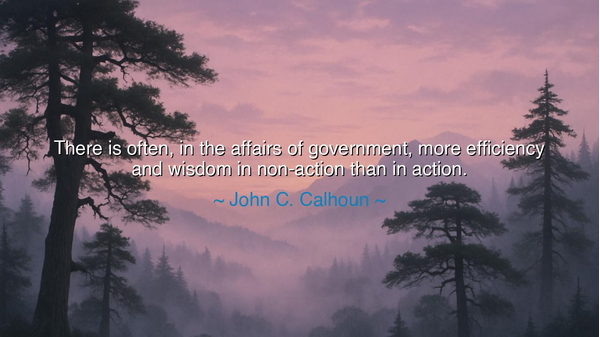
There is often, in the affairs of government, more efficiency and
There is often, in the affairs of government, more efficiency and wisdom in non-action than in action.






“There is often, in the affairs of government, more efficiency and wisdom in non-action than in action.” — Thus spoke John C. Calhoun, a statesman of the nineteenth century, whose mind was sharp as a blade and whose understanding of power was steeped in the deep wisdom of restraint. In these words lies a paradox that the impatient heart of mankind struggles to accept: that sometimes, the greatest act of governance is not to act at all. For though action burns brightly and makes a show of strength, wisdom often dwells in silence, and true leadership knows when to stay its hand.
Calhoun, who lived in an age of division and upheaval, had seen the restless machinery of government grind against itself — laws made in haste, decrees issued in passion, reforms born of fury rather than reason. He understood that government, like fire, must be handled with care, for it consumes as easily as it warms. He saw that the more the state meddles in the affairs of men, the more it risks kindling chaos instead of order. Thus, he counseled patience, for in patience there is prudence, and in restraint there is strength.
His words remind us that power is a dangerous elixir — one that tempts rulers to believe that motion itself is progress, that to govern is to always interfere. Yet Calhoun knew better. He knew that when leaders act without reflection, they may cure the symptom and kill the patient. The path of wise rule, he taught, is to discern not only what must be done, but what must be left undone. For every law passed breeds another law to mend it, and every decree meant to fix one problem may awaken three more. Thus, he spoke not as a man of inaction, but as a guardian of moderation, warning that restraint is the highest form of power.
History offers many lessons to prove his wisdom. Consider the tale of Emperor Augustus, who inherited Rome in the ashes of civil war. His predecessors, drunk on ambition, had reshaped the republic with violence and haste. But Augustus, seeing the ruin that reckless reform had wrought, chose a gentler path. He ruled by subtlety — governing through patience, restoring peace not by constant decree, but by allowing the empire to heal. His restraint brought two centuries of stability to Rome, an era remembered as the Pax Romana, the Roman Peace. His strength lay not in conquest, but in the wisdom to know when to act and when to refrain.
And contrast this with the folly of those rulers who mistook activity for wisdom — the kings who taxed their people into rebellion, the assemblies that passed laws faster than they could be lived by. The French Revolution, born in righteous anger, devoured itself through unceasing motion. Each act of reform led to another act of blood. The leaders could not stop; their passion for change became its own tyranny. There was no space for non-action, no pause for reflection — and so liberty, born in fire, perished in its own flame.
Calhoun’s insight is not confined to rulers and statesmen; it belongs to all who hold responsibility. In our own lives, we too are tempted to act quickly, to fix every wrong, to control every outcome. Yet often, wisdom whispers: wait. Let time reveal what force cannot. There is a balance between passivity and prudence, between cowardice and calm. The wise man, like the wise ruler, learns to master his impulses, knowing that not every storm must be met with the raising of sails — some are best weathered by anchoring and stillness.
Therefore, let this teaching be written upon your heart: true leadership is not measured by the noise of its actions, but by the peace of its results. Restrain the hand that acts in haste. Let reason be the charioteer of passion. In government, in business, in the affairs of your own life, remember that silence can be stronger than speech, and patience more powerful than decree. For inaction, when guided by understanding, is not weakness — it is the highest form of wisdom, the wisdom to trust that not all order is made by force, and not all progress requires motion.
So heed Calhoun’s words, and pass them to your children: “There is often, in the affairs of government, more efficiency and wisdom in non-action than in action.” May every ruler, every citizen, every soul who holds power remember — that the mightiest hand is not the one that strikes, but the one that can remain still.






AAdministratorAdministrator
Welcome, honored guests. Please leave a comment, we will respond soon